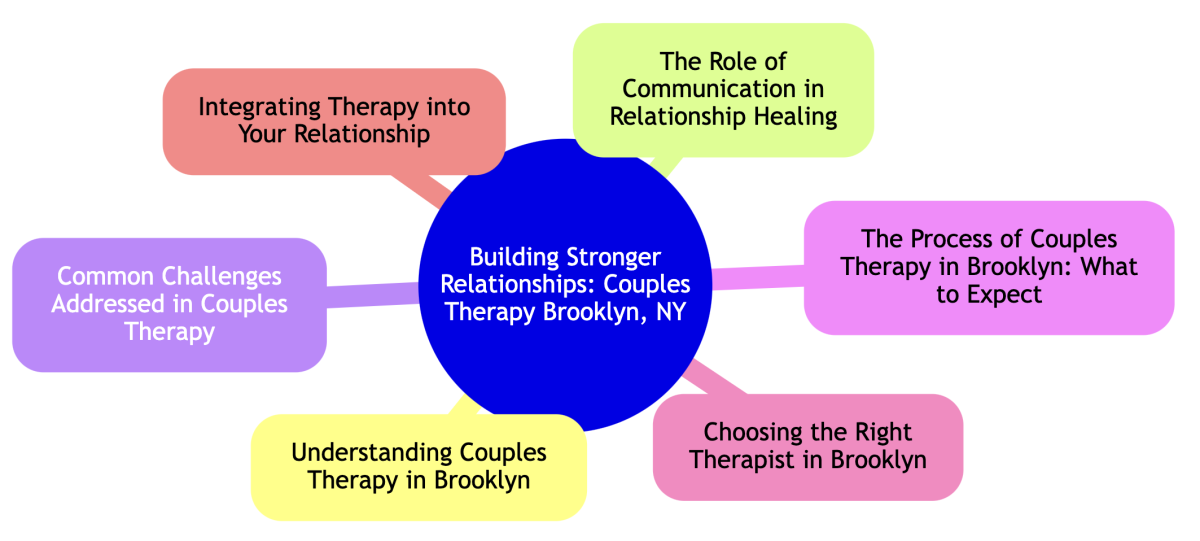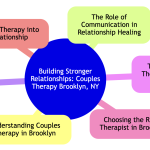Introduction - A Trusted Brooklyn Psychologist
Couples therapy offers a resource for partners looking to strengthen their relationship and heal their weakened affections.
This form of therapy goes deep into the heart of relationship issues, offering strategies and insights that foster understanding, intimacy, and resilience. It's a process that transforms challenges into opportunities for growth - ensuring every session brings partners closer to a more fulfilling bond.
-This article is brought to you by Dr. David Tzall, Brooklyn Psychologist. Reach out today for the best Couples Counseling Brooklyn has to offer!
Key Takeaways
- Effective Strategies: Couples therapy offers effective strategies for improving relationship dynamics.
- Communication Skills: It focuses on enhancing communication skills for deeper understanding.
- Conflict Management: Provides tools for managing and resolving conflicts constructively.
- Growth and Healing: Facilitates personal growth and healing within the relationship context.
- Strengthened Bond: Aims to strengthen the emotional bond between partners, enhancing intimacy and trust.

Understanding Couples Therapy
Couples therapy is a crucial intervention for partners facing relationship hurdles. It's an approach that addresses the unique challenges of modern relationships, providing a safe setting for both individuals to express their feelings and work through issues together.
The goal is to resolve immediate conflicts and equip couples with the skills needed for a lasting and healthy relationship.
The Role of Communication in Relationship Healing
Effective communication is the cornerstone of any strong relationship, and it's at the heart of what couples therapy seeks to improve. Through therapy, couples learn to break down barriers that have hindered their ability to connect and understand each other.
- Listen Actively: Make an effort to truly hear and understand your partner's perspective.
- Speak Honestly: Express your thoughts and feelings openly and respectfully.
- Manage Emotions: Learn to stay calm and composed, even in heated moments.
- Seek Clarity: Ask questions to ensure you understand your partner's viewpoint.
- Practice Empathy: Try to see situations from your partner's perspective, fostering a deeper emotional connection.
Common Challenges Addressed in Couples Therapy
Emotional Disconnect
Couples therapy tackles emotional disconnect head-on.
Therapists guide couples through exercises that reignite empathy and understanding. It's about finding the lost connection, piece by piece.
Sessions focus on opening up, sharing vulnerabilities, and truly seeing each other again. This journey back to each other is profound.
Conflict Resolution
Conflict doesn't have to be a roadblock.
In therapy, couples learn to navigate disagreements with grace. Techniques like active listening, fair fighting rules, and time-outs transform conflicts. They become opportunities for growth instead of sources of pain. It's about fighting the problem, not each other.
Rebuilding Trust
Betrayal shakes the foundation of trust. Therapy provides a path to rebuilding it. The process is gradual, involving honesty, accountability, and forgiveness.
Therapists help couples establish new, healthy patterns of interaction—trust returns, step by careful step, rebuilding the relationship stronger than before.
The Process of Couples Therapy: What to Expect
Deciding on couples therapy means starting a journey towards a healthier relationship. The process is tailored to each couple but follows a general path designed to uncover and address the root causes of issues.
- Initial Assessment: Therapists conduct thorough assessments to understand the relationship's dynamics and the individual needs of each partner.
- Goal Setting: Couples and therapists collaboratively set goals to focus the therapy sessions on achieving tangible outcomes.
- Communication Skills Training: A core component where couples learn and practice new communication methods to enhance understanding and empathy.
- Conflict Management Techniques: Couples are equipped with strategies to manage and resolve conflicts constructively, without causing harm to the relationship.
- Emotional Reconnection Exercises: Activities and discussions designed to rekindle emotional intimacy and reconnect partners on a deeper level.
- Trust-Building Activities: Specific exercises aimed at rebuilding trust, including transparency drills and commitment exercises.
Choosing the Right Therapist.
When looking for a new therapist, check for credentials first.
A licensed therapist with a strong background in couples therapy is a must. Experience matters, especially with issues similar to yours.
But it's not just about qualifications. The therapist's approach should resonate with you.
Some therapists use cognitive-behavioral techniques, others prefer emotion-focused therapy. Research and ask questions to find a fit that feels right. Personal compatibility plays a huge role too.
Therapy is a deeply personal practice. You need someone you can trust, feel comfortable with, and openly communicate with. It's okay to shop around. Many therapists offer initial consultations. Use these meetings to gauge how you feel about them. The right therapist will make you feel heard, respected, and understood.
Integrating Therapy into Your Relationship
Integrating therapy into your relationship transforms lessons into lasting change. It's about taking those insights and making them part of your daily life. Here's how:
- Practice Active Listening: Make a conscious effort to listen to your partner without interrupting. Understand their perspective before responding.
- Use "I" Statements: Communicate your feelings and needs without blaming. Start sentences with "I feel" or "I need" to avoid accusations.
- Schedule Regular Check-ins: Set aside time each week to discuss your relationship openly and honestly, away from distractions.
- Manage Conflicts Wisely: Apply the conflict resolution strategies learned in therapy. Recognize when to take a break if emotions run high.
- Show Appreciation: Small gestures of appreciation can reinforce positive changes and remind you both of the progress you're making.
Final Thoughts - Your Trusted Brooklyn Couples Counselor
Couples therapy offers a pathway to stronger, more resilient relationships. It's about building a foundation of understanding, communication, and respect for each other. The journey requires commitment, openness, and the right therapist guiding you to a healthy relationship. Remember, the goal is growth—both as individuals and as a couple.
As you consider taking this step, think of Dr. Tzall and his practice. His expertise in couples therapy provides a supportive environment for partners to navigate their challenges and rediscover their connection. If you're ready to embark on this transformative journey, please reach out. Together, you can take the first step towards a deeper, more fulfilling relationship.




